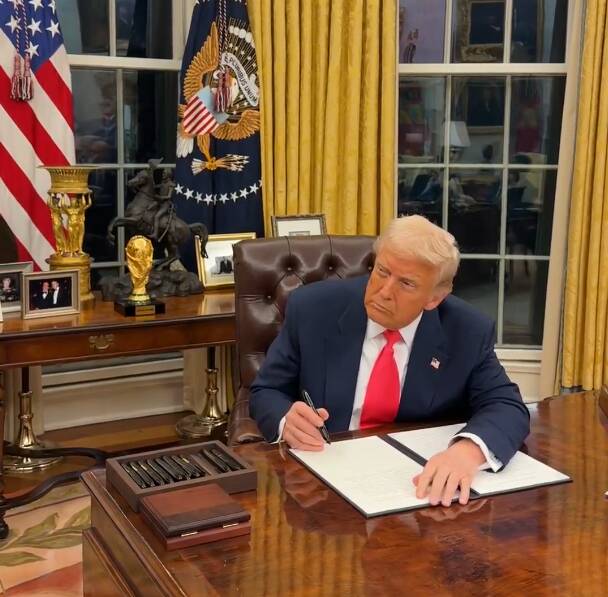Today in the evolving cryptocurrency landscape, both Argentina and the United States are making headlines with their approaches to digital assets. Argentina has recently put in place comprehensive regulations for virtual asset service providers, aiming to ensure a safer and more transparent environment for cryptocurrency transactions. The new rules, which were published by the National Securities Commission, establish standards for registration, cybersecurity, and customer protection for companies operating in the crypto space.
Meanwhile, in the U.S., a new legislative initiative seeks to solidify a Bitcoin reserve originally proposed by former President Donald Trump. This bill, introduced by Representative Byron Donalds, aims to formalize an executive order allowing the government to use Bitcoin seized from criminal cases as a national reserve. While some lawmakers, such as Democrat Representative Gerald, are advocating for the U.S. Treasury to halt efforts on this initiative, Donalds argues for the importance of establishing a permanent Bitcoin reserve as part of the nation’s financial strategy.
“For years, the Democrats waged war on crypto. Now is the time for Congressional Republicans to decisively end this war,” stated Donalds, emphasizing the changing political tides regarding cryptocurrency.
In a noteworthy development, David Sacks, co-founder of Craft Ventures, disclosed that he divested over 0 million in crypto-related assets before stepping into his role as the White House czar for AI and crypto. This move was reportedly part of efforts to mitigate potential conflicts of interest as he embarks on creating a legal framework for the cryptocurrency industry.
These developments not only highlight the rapid changes in global cryptocurrency regulations but also underline the divergent views on how to integrate digital assets into traditional financial systems. As nations and leaders navigate this dynamic landscape, the implications of these actions will be felt across the crypto community and beyond.
Key Developments in Crypto Regulation and Strategy
Recent updates in the cryptocurrency landscape across Argentina and the United States signify critical changes in regulation and strategy that could impact the crypto market and its users.
- Argentina’s New Crypto Regulations:
- The National Securities Commission (CNV) has finalized rules for virtual asset service providers (VASPs).
- New regulations impose obligations regarding:
- Registration
- C ybersecurity
- Asset custody
- Money laundering prevention
- Risk disclosure
- Goal is to enhance transparency, stability, and user protection within the crypto ecosystem.
- US Strategic Bitcoin Reserve Bill:
- A new bill aims to formalize Donald Trump’s executive order creating a US Strategic Bitcoin Reserve.
- The reserve would use Bitcoin seized in government criminal cases to integrate Bitcoin into the nation’s financial strategy.
- US Representative Byron Donalds is championing the bill, advocating for a more supportive environment for crypto.
- Conflicts of Interest Addressed:
- David Sacks, a newly appointed White House AI and crypto czar, divested over 0 million in crypto before assuming his role.
- Steps were taken to reduce potential conflicts of interest, which is vital for maintaining public trust in the regulatory process.
These developments indicate a push towards more structured and regulated cryptocurrency environments, potentially influencing how investors and users interact with digital assets.
These changes may impact readers by affecting their investment strategies and the overall security of the crypto transactions they engage in. Staying informed about these regulations can help users navigate the evolving landscape of digital assets confidently.
Argentina and the US: Divergent Paths in Crypto Regulation
In the ever-evolving landscape of cryptocurrency regulation, Argentina’s recent establishment of guidelines for virtual asset service providers (VASPs) contrasts sharply with the burgeoning discussions around the US Strategic Bitcoin Reserve. Argentina’s newly forged regulations aim to bolster user protection and promote stability, which is a notable step toward legitimizing the crypto space in a country where regulatory frameworks have been relatively lax. In comparison, the US is grappling with its political dynamics as it seeks to solidify a national reserve of Bitcoin, an initiative that is not without its controversies.
Argentina’s Competitive Advantage: The introduction of stringent rules for VASPs in Argentina addresses several critical issues affecting the crypto market, including cybersecurity and anti-money laundering protocols. This proactive stance may enhance investor confidence and drive institutional interest, creating an environment conducive to innovation and growth within the region. Furthermore, by mandating the separation of customer and company funds, Argentina can foster a more reliable ecosystem that prioritizes user safety.
US Challenges with Regulation: On the flip side, the push for a Strategic Bitcoin Reserve in the US raises questions about the interplay between governmental initiatives and market dynamics. While some view this as a necessary step to anchor Bitcoin within a traditional financial strategy, detractors, including Democratic Representative Gerald, express concerns about the implications of politicizing the cryptocurrency market. The ongoing tussle may deter some investors who prefer a smoother regulatory path, instead opting for jurisdictions that showcase clear and consistent frameworks.
Who Benefits? Businesses and investors in Argentina can greatly benefit from the new regulations as it provides clarity and a structured operational environment. This could attract more foreign investment and position Argentina as a burgeoning crypto hub in Latin America. Conversely, the proposed US legislation could solidify the presence of Bitcoin in American finance, appealing to those who view government backing as a strong vote of confidence in the asset’s future viability. However, this same framework could deter innovators wary of potential regulatory overreach, which could stifle creativity and entrepreneurship within the crypto domain.
Potential Issues Ahead: The introduction of regulations in Argentina may inadvertently push some crypto firms to relocate to less regulated environments, undermining the country’s intention to establish itself as a safe haven for digital assets. Meanwhile, the political battleground in the US concerning crypto reserves could lead to policy instability, creating uncertainty for investors, particularly if the balance of power shifts in future elections. In summary, while Argentina seeks to enhance its crypto landscape through new regulations, the US debates the permanence of crypto assets amid competing political ideologies, showcasing the complex interplay between innovation and regulation in the global crypto arena.

















